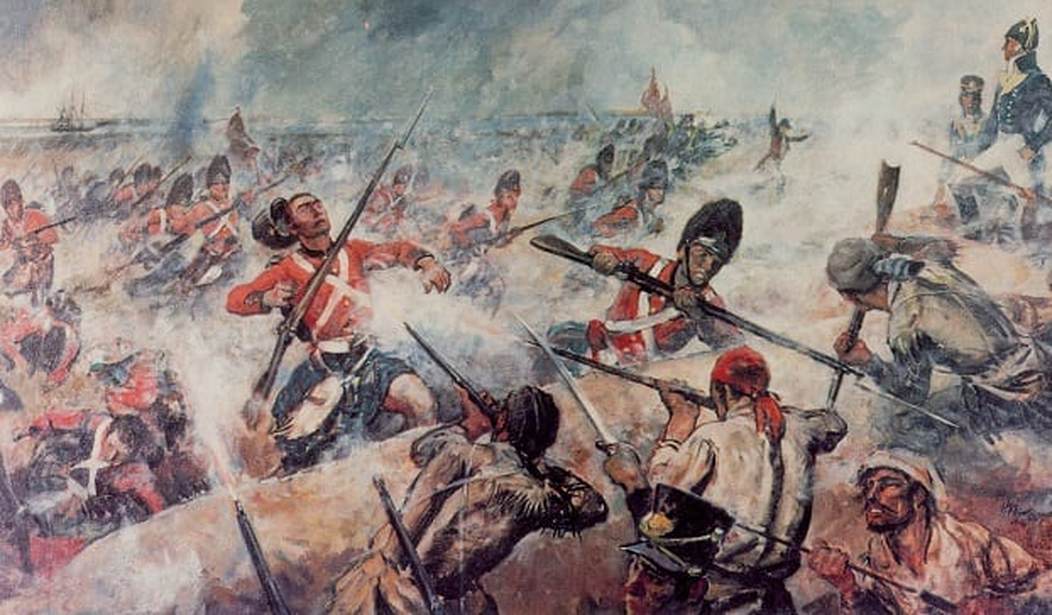Our land victories in the War of 1812 were few an far between. If you view the happenings from the viewpoint of engagements between US forces (regular and militia) and British forces, and exclude skirmishes and battles fought with British Indian allies then the score approaches a shut out with a couple of ties (Chippewa and Lundy’s Lane). The signal American land victory of the war was the Battle of New Orleans (be sure to read my colleague Joe Cunningham’s rundown of the battle).
On April 11, 1814, the allies in the War of the Sixth Coalition signed the Treaty of Fonatainbleu with France. One of the provisions of that treaty was the exile of Napoleon Bonaparte to Elba. While this allowed the British to focus their attention on the pimple on their behind that was the war with the United States, Britain was experiencing economic and social turmoil as it had been at war with France and whatever allies France had at the moment nearly continuously since 1792 and wanted to bring the matter to a close. While General Sir Edward Packenham was dispatched with an army fresh from fight France to assume command of operations in North America, the governments of the United States and Great Britain were engaged in negotiations to end the war. A treaty ending the war was signed on December 24, 1814 in Ghent. By that time Packenham was in the Gulf of Mexico and it took about six weeks for a ship to transit the Atlantic.
So on January 8, 1815, two weeks after a peace treaty had been signed, the Old Hickory “met the bloody British in the town of New Orleans.” The Battle of New Orleans contributed a mighty legend to popular US history, gave us a damned good song by Jimmy Driftwood, and produced a future president in the person of Andrew Jackson the rap that has always been hung on the that battle was that it didn’t matter.
As it turns out, it did matter one helluva lot.
“What I was taught in school, like most of us, was that the Battle of New Orleans was irrelevant,” said C.J. Longanecker, a former National Park Service ranger who worked for years at the Chalmette Battlefield, a national park dedicated to the battle.
In reality, historians now say, the peace treaty was only as good as the paper it was written on.
A big discovery has come from British war records: A set of secret orders given in October 1814 to Maj. Gen. Edward Pakenham, the commander of the British invasion of the Gulf Coast.
The orders directed Pakenham to fight on regardless of any peace deal and capture New Orleans, said Ronald Drez, the military historian who uncovered the orders. He dug up the records last spring during research in London for his new book, “The War of 1812, Conflict and Deception: The British Attempt to Seize New Orleans and Nullify the Louisiana Purchase.”
This should put to rest any doubt about British designs in America, Drez argues.
“It truly is the smoking gun,” Drez said. “They say to Pakenham: ‘If you hear of a peace treaty, pay no attention, continue to fight.'”
Drez found the orders among military records in The National Archives at Kew in London.
This bit of information changes the strategic context of the last couple of months of the War of 1812. In September 1814, a small detachment of British marines tried to take Fort Bowyer near Mobile, AL. Mobile has a great natural anchorage suited for maintaining naval control of the Gulf and could serve as a dockyard as well. New Orleans controlled access to the Mississippi River. If the British owned New Orleans, the future of the Louisiana Purchase was up for grabs as overland commerce did not become a reality until the commercial development of the railroad. Without New Orleans, trade between the Purchase and the eastern seaboard of the United States simply could not have happened. The rapid settlement of the Mississippi Valley would have been prevented. That, in turn, would have delayed the move west. Even if gold had still been discovered at Sutter’s Mill, without well equipped jumping off points like St. Louis the trip would have been much more arduous. The Monroe Doctrine would never have been promulgated if the Gulf Coast had been controlled by Britain. Texas and the Gadsden Purchase would still be in Mexico because the route used by Americans to travel to Texas was via New Orleans.
A British victory followed by a refusal to evacuate Mobile and New Orleans would have altered the history of the United States and the western world in ways that are nearly unimaginable.
Little did the backwoodsmen and Gulf Coast pirates and Creole militia that crouched behind those cotton bales on that January day realize what was at stake.
December 24, 1814













Join the conversation as a VIP Member